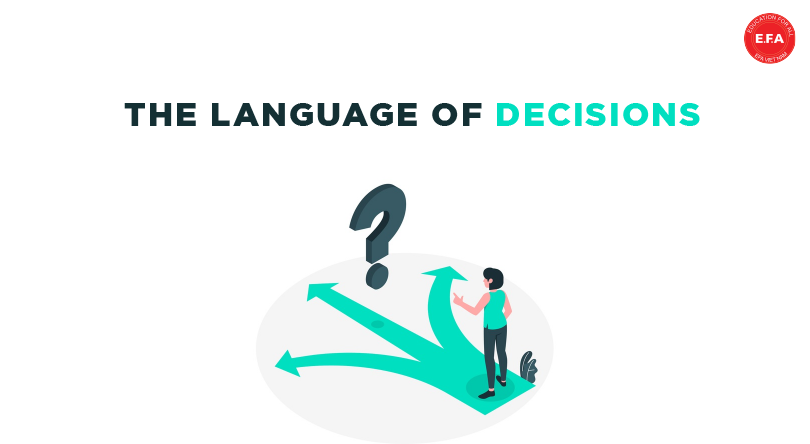Một trong những cách tốt nhất (có lẽ là cách tốt nhất) để cải thiện tiếng Anh của bạn là tìm hiểu cách các từ đi với nhau trong các cụm từ, thành ngữ hoặc các mẫu khác như cặp động từ / danh từ hoặc tính từ / danh từ (thường được gọi là “Collocation”). Vậy bạn có muốn cải thiện tiếng Anh của bản thân hay không? Hãy cùng EFA Việt Nam tìm hiểu về các collocation với chủ đề “The language of decision” nhé!

Firstly, make is the verb most often used with decision, but we often say that we reach or come to a decision too, especially when we need to put a lot of thought into it (= think about it carefully).
If we have a difficult/tough decision to make, we will want to take time to consider the pros and cons/advantages and disadvantages of the possible choices (= the good and bad things about them). We will weigh them up (= decide which are most important) carefully. When there is more than one thing we could do in a situation, we have to consider our options.
If we mull something over, we take time to think about it calmly and carefully. When it comes to a particularly difficult decision, people often want to stress how seriously they have thought about it. They may say that they have thought long and hard about it or that they did not take the decision lightly.
We use phrases such as bear something in mind and take something into consideration to talk about how we think about a particular fact when we are making up our mind (= deciding).
If you are torn between; two options, you find it very difficult to decide which one to choose. You might decide to seek (= try to get) advice or do some research in order to help you make an informed decision (= with all the facts you need). You might also decide to talk it over with someone else, to see what they think.
If you toy with the idea of doing something, you consider it, but not very seriously, and if you have second thoughts about something, you realize that you are not happy with a decision, and may decide to change it.
This may be because you made a hasty decision (= decided too quickly). A snap decision is also a very fast decision, but is usually used in a more positive way to describe something you decide very suddenly.
Finally, if you do not agree with a decision – and if you have the power! – you can overturn or reverse it (= change things to the way they were before).
Collocation – Chủ đề “The language of decisions”:
- put a lot of thought into: suy nghĩ một cách cẩn thận.
- difficult/tough decision: quyết định khó khăn.
- consider the pros and cons/advantages and disadvantages: xem xét ưu và nhược điểm.
- weigh something up: quyết định xem cái gì quan trọng nhất.
- consider somebody’s options: xem xét lựa chọn của ai đó.
- mull something over: nghiền ngẫm cái gì đó.
- think long and hard: suy nghĩ lâu và cẩn thận.
- do not take the decision lightly: đừng xem nhẹ quyết định.
- bear something in mind: ghi nhớ điều gì đó.
- take something into consideration: cân nhắc điều gì đó.
- making up somebody’s mind: quyết định.
- torn between: giằng xé.
- seek advice: tìm kiếm lời khuyên.
- do some research: làm một vài nghiên cứu.
- informed decision: quyết định sáng suốt.
- talk it over: thảo luận về việc gì đó.
- toy with something: chơi đùa với cái gì đó.
- have second thoughts: có suy nghĩ lần thứ 2.
- hasty decision: quyết định vội vã.
- snap decision: quyết định nhanh chóng.
- overturn: lật ngửa.
- reverse: đảo ngược.
Xem thêm: Collocation – Bí mật giúp bài IELTS Writing của bạn ấn tượng hơn.
Proverbs in English: Một số tục ngữ phổ biến trong tiếng Anh – Phần 3.
Hy vọng bài viết trên hữu ích đối với bạn! Hãy theo dõi EFA Việt Nam, vì chúng mình sẽ cập nhật thêm nhiều collocation thú vị khác nữa. Nếu bạn có thắc mắc gì, đừng ngại liên hệ với EFA Việt Nam để nhận tư vấn trực tiếp nhé! Chúc bạn may mắn và thành công trên con đường ôn luyện tiếng Anh nhé!
